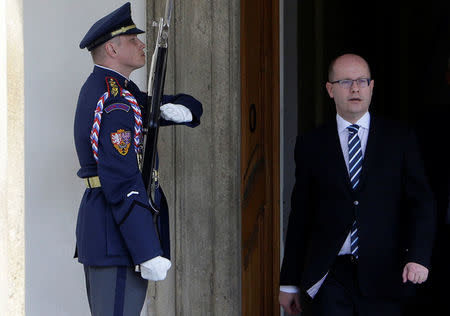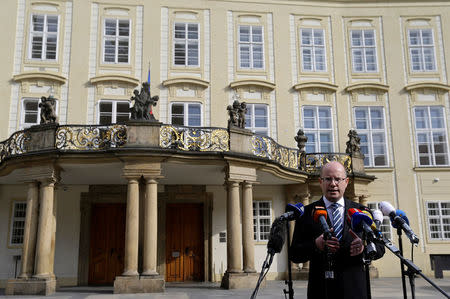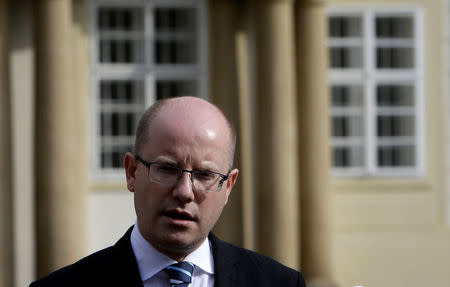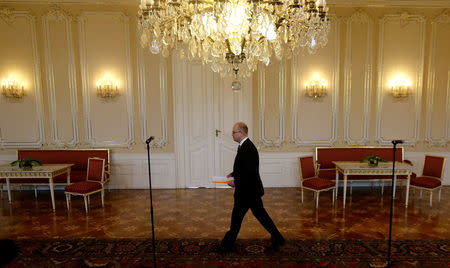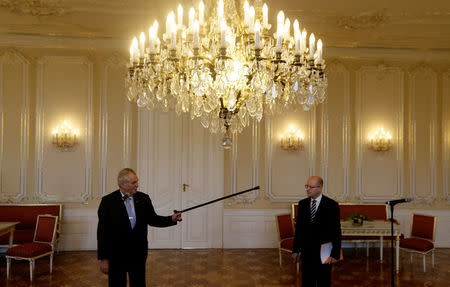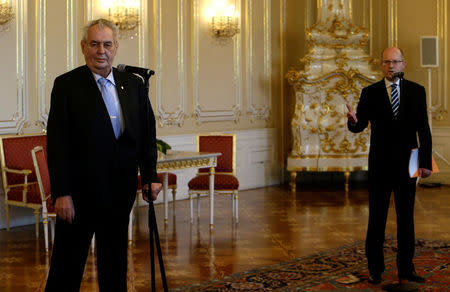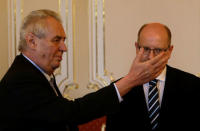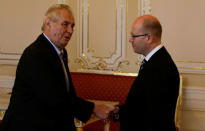Czech prime minister delays resignation as parties seek way forward
By Robert Muller and Jan Lopatka PRAGUE (Reuters) - Czech Prime Minister Bohuslav Sobotka postponed on Thursday tendering his cabinet's resignation until the second half of May, buying time to push through a plan for a new government before stepping down. Sobotka announced on Tuesday he and the government would quit, less than six months before its term ends, to resolve a dispute with billionaire Finance Minister Andrej Babis, founder of the popular anti-establishment ANO movement. The prime minister wants to form a new cabinet without Babis, whose business practices he has questioned, even if that means stepping aside himself. A new cabinet could include a replacement for Sobotka from his Social Democrat party, either Foreign Minister Lubomir Zaoralek or Interior Minister Milan Chovanec, Zaoralek told reporters on Thursday. President Milos Zeman, who has the right to choose the next government leader, said in a television interview on Thursday evening that Zaoralek and Chovanec were potential candidates. He said he might also consider Pavel Belobradek, who heads the Christian Democrats, the third and smallest party in the governing coalition. Zeman also said the government team should remain "in the same composition" barring Sobotka - implying Babis should keep the finance ministry seat, which would go against the one condition the Social Democrats have set. Zeman appoints individual ministers on the recommendation of the prime minister, which means there needs to be a wider deal. "The government crisis can be over in 10 minutes," Sobotka earlier told reporters. "All it takes is for Andrej Babis to recognise his responsibility and put the interests of the Czech Republic ahead of his desire to remain finance minister." Sobotka says Babis - the Czech Republic's second-richest businessman - has failed to give convincing explanations for some of his past business deals. Babis has come under fire over the legality of using tax-free bonds and of the payment of European Union small business subsidies to a company he ultimately acquired. Babis, who has good relations with Zeman, has repeatedly denied wrongdoing and said he had no reason to quit. All three parties in Sobotka's governing coalition want to avoid a snap election before national elections scheduled for Oct. 20-21. BLURRED LINES Sobotka had planned to tender the government's resignation to Zeman on Thursday. But he held back, in part due to the possibility that Zeman, whose relations with Sobotka are poor, might consider Sobotka's resignation his personal move and not the cabinet's, which would have left Babis in place. "I can hardly submit the resignation at a moment when it is not clear how the (presidential office) will handle it," Sobotka said. Past prime ministerial resignations have meant the automatic fall of the government. While several lawyers said the constitution implied the prime minister's resignation means the fall of the entire cabinet, some experts have said it also allowed the interpretation that such a resignation, without a cabinet vote, might only mean the departure of the prime minister. Zeman gave Sobotka a dressing down in front of cameras on Thursday afternoon, implying the postponement of the resignation plan was handled clumsily by the prime minister's office. The two men later met behind closed doors. The sense of a government in turmoil was heightened this week by wiretaps released by an anonymous Twitter user that appeared to show Babis interfering in news coverage of political rivals at one of the newspapers now in his trust fund. In an interview with news website DVTV, Babis denied any interference and said he would file a criminal complaint related to the matter. Babis' Agrofert group, which he shifted to a trust fund earlier this year, includes hundreds of firms in chemicals and farming, as well as two national newspapers and a radio station. (Editing by Gareth Jones and John Stonestreet)

 Yahoo News
Yahoo News 